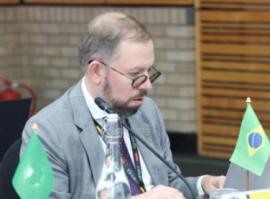
Brazil says G20 countries can learn from one another’s experiences in advancing gender equality and accelerate progress towards ending gender-based violence and building inclusive care systems.
As the country that handed over the baton to South Africa in November last year, Brazil participated in the Third Technical Meeting of the G20 Empowerment of Women Working Group (EWWG), where it shared impactful strategies that other countries could replicate.
The meeting was held at the Skukuza Conference Centre at the Kruger National Park in Mpumalanga.
Speaking to SAnews on Thursday, Head of the Office for International Affairs at the Brazilian Ministry of Women, Ezequiel Gerd Peterson, outlined Brazil’s expanding network of Casas da Mulher Brasileira (Brazilian Women’s Houses).
“The one thing that we have and are improving is the Casas da Mulher Brasileira – Brazilian Women Houses – that are integrated centres where various services are delivered to women. Psychosocial services, police services, and shelters for women experiencing violence are all in one place,” Peterson said.
Brazil currently operates 16 of these centres, with 21 under construction and another 21 in the pipeline.
Peterson said President Luiz Inácio Lula da Silva’s administration had strengthened emergency response mechanisms through a national violence hotline, now staffed by 222 operators, and the addition of a WhatsApp reporting channel.
“We also enacted a law this year that increases by 50% the penalty of imprisonment in cases of psychological violence against women that are committed through public dissemination,” Peterson said, noting this as a major development in prevention.
Brazil is also shifting social mindsets with its Femicide Zero campaign, which is being rolled out in partnership with football clubs and major cultural events like the annual carnival.
“It’s about changing culture and mentality – aimed at men and society as a whole. Violence against women isn’t just a problem between couples – it’s a societal issue, and we must intervene,” Peterson said.
Reflecting on the broader G20 discussions, he added: “This is a problem not only in the global South, but also in developed countries. No country is immune. We all have homework to do. We can learn from each other, and there are many experiences around the world that can help us.”
Peterson also stressed the urgency of tackling technology-facilitated gender-based violence through coordinated global action.
“These are international issues. People can commit acts of violence against women from anywhere using a laptop or cell phone. If only one country regulates it, that won’t solve the problem. We need joint responses, and digital intelligence must keep improving,” he said.
Bolstering support for care work
Also weighing in on Brazil’s evolving gender agenda was Leticia Peret, General Coordinator of Care Policies at the Brazilian Ministry of Women. She detailed how Brazil is building a national care system grounded in inter-ministerial cooperation and participatory governance.
“Brazil’s experience offers valuable insights that may support collective learning and inspire national strategies elsewhere,” Peret told SAnews.
A presidentially mandated working group brought together nearly 20 ministries, including the Ministry of Women and the Ministry of Social Development and Fight against Hunger, to coordinate the national care policy. Technical chambers were formed to dive deeper into areas such as automation, legislative monitoring, and policy management.
“Brazil defined care as the daily work – paid and unpaid – essential to sustaining life, wellbeing and society. This conceptual clarity guided the policy actions of each ministry,” she said.
Peret highlighted that civil society played a central role in shaping the policy, particularly organisations representing care workers.
“Participatory methods were not only crucial for legitimacy but also ensured that the policy responded to real and urgent demands,” she said.
Brazil also linked its care strategy to national planning and budgeting systems, including a multi-year plan and gender-responsive budgeting tools.
“Together, these strategies demonstrate the importance of inter-ministerial coordination, conceptual clarity, participatory governance and integration into national systems. They offer a replicable foundation for other countries seeking to build care systems that are inclusive, equitable, and transformative,” Peret said. – SAnews.gov.za


